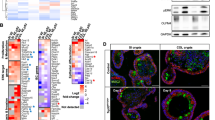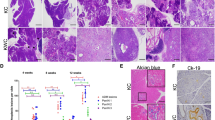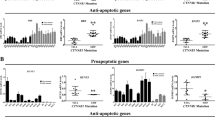Abstract
Apc-driven tumor formation in patients and Apc-mutant mouse models is generally attributed to increased levels of β-catenin signaling. We and others have proposed that a specific level of β-catenin signaling is required to successfully initiate tumor formation, and that each tissue prefers different dosages of signaling. This is illustrated by APC genotype−tumor phenotype correlations in cancer patients, and by the different tumor phenotypes displayed by different Apc-mutant mouse models. Apc1638N mice, associated with intermediate β-catenin signaling, characteristically develop intestinal tumors (<10) and extra-intestinal tumors, including cysts and desmoids. Apc1572T mice associated with lower levels of β-catenin signaling are free of intestinal tumors, but instead develop mammary tumors. Although the concept of β-catenin signaling dosage and its impact on tumor growth among tissues is gaining acceptance, it has not been formally proven. Additionally, alternative explanations for Apc-driven tumor formation have been proposed. To obtain direct evidence for the dominant role of β-catenin dosage in tumor formation and tissue-specific tumor predisposition, we crossed Apc1638N mice with heterozygous β-catenin knockout mice, thereby reducing β-catenin levels. Whereas all the Apc1638N;Ctnnb1+/+ mice developed gastrointestinal tumors, none were present in the Apc1638N;Ctnnb1−/+ mice. Incidence of other Apc1638N-associated lesions, including desmoids and cysts, was strongly reduced as well. Interestingly, Apc1638N;Ctnnb1−/+ females showed an increased incidence of mammary tumors, which are normally rarely observed in Apc1638N mice, and the histological composition of the tumors resembled that of Apc1572T-related tumors. Hereby, we provide in vivo genetic evidence confirming the dominant role of β-catenin dosage in tumor formation and in dictating tumor predisposition among tissues in Apc-driven cancer.
This is a preview of subscription content, access via your institution
Access options
Subscribe to this journal
Receive 50 print issues and online access
$259.00 per year
only $5.18 per issue
Buy this article
- Purchase on Springer Link
- Instant access to full article PDF
Prices may be subject to local taxes which are calculated during checkout




Similar content being viewed by others
References
Reya T, Clevers H . Wnt signalling in stem cells and cancer. Nature 2005; 434: 843–850.
Albuquerque C, Bakker ER, van Veelen W, Smits R . Colorectal cancers choosing sides. Biochim Biophys Acta 2011; 1816: 219–231.
Albuquerque C, Breukel C, van der Luijt R, Fidalgo P, Lage P, Slors FJ et al. The ‘just-right’ signaling model: APC somatic mutations are selected based on a specific level of activation of the beta-catenin signaling cascade. Hum Mol Genet 2002; 11: 1549–1560.
Lamlum H, Ilyas M, Rowan A, Clark S, Johnson V, Bell J et al. The type of somatic mutation at APC in familial adenomatous polyposis is determined by the site of the germline mutation: a new facet to Knudson's ‘two-hit’ hypothesis. Nat Med 1999; 5: 1071–1075.
Crabtree M, Sieber OM, Lipton L, Hodgson SV, Lamlum H, Thomas HJ et al. Refining the relation between ‘first hits’ and ‘second hits’ at the APC locus: the 'loose fit' model and evidence for differences in somatic mutation spectra among patients. Oncogene 2003; 22: 4257–4265.
Smits R, Hofland N, Edelmann W, Geugien M, Jagmohan-Changur S, Albuquerque C et al. Somatic Apc mutations are selected upon their capacity to inactivate the beta-catenin downregulating activity. Genes Chromosomes Cancer 2000; 29: 229–239.
Leedham SJ, Rodenas-Cuadrado P, Howarth K, Lewis A, Mallappa S, Segditsas S et al. A basal gradient of Wnt and stem-cell number influences regional tumour distribution in human and mouse intestinal tracts. Gut 2012, e-pub ahead of print 27 January 2012 doi:10.1136/gutjnl-2011-301601.
Albuquerque C, Baltazar C, Filipe B, Penha F, Pereira T, Smits R et al. Colorectal cancers show distinct mutation spectra in members of the canonical WNT signaling pathway according to their anatomical location and type of genetic instability. Genes Chromosomes Cancer 2010; 49: 746–759.
Incassati A, Chandramouli A, Eelkema R, Cowin P . Key signaling nodes in mammary gland development and cancer: beta-catenin. Breast Cancer Res 2010; 12: 213.
Smits R, van der Houven van Oordt W, Luz A, Zurcher C, Jagmohan-Changur S, Breukel C et al. Apc1638N: a mouse model for familial adenomatous polyposis-associated desmoid tumors and cutaneous cysts. Gastroenterology 1998; 114: 275–283.
Gaspar C, Franken P, Molenaar L, Breukel C, van der Valk M, Smits R et al. A targeted constitutive mutation in the APC tumor suppressor gene underlies mammary but not intestinal tumorigenesis. PLoS Genet 2009; 5: e1000547.
Fodde R, Kuipers J, Rosenberg C, Smits R, Kielman M, Gaspar C et al. Mutations in the APC tumour suppressor gene cause chromosomal instability. Nat Cell Biol 2001; 3: 433–438.
Nathke I . Cytoskeleton out of the cupboard: colon cancer and cytoskeletal changes induced by loss of APC. Nat Rev Cancer 2006; 6: 967–974.
Phelps RA, Chidester S, Dehghanizadeh S, Phelps J, Sandoval IT, Rai K et al. A two-step model for colon adenoma initiation and progression caused by APC loss. Cell 2009; 137: 623–634.
Schneikert J, Brauburger K, Behrens J . APC mutations in colorectal tumours from FAP patients are selected for CtBP-mediated oligomerization of truncated APC. Hum Mol Genet 2011; 20: 3554–3564.
Hamada F, Bienz M . The APC tumor suppressor binds to C-terminal binding protein to divert nuclear beta-catenin from TCF. Dev Cell 2004; 7: 677–685.
Fodde R, Edelmann W, Yang K, van Leeuwen C, Carlson C, Renault B et al. A targeted chain-termination mutation in the mouse Apc gene results in multiple intestinal tumors. Proc Natl Acad Sci USA 1994; 91: 8969–8973.
Huelsken J, Vogel R, Erdmann B, Cotsarelis G, Birchmeier W . beta-Catenin controls hair follicle morphogenesis and stem cell differentiation in the skin. Cell 2001; 105: 533–545.
Mahmoud NN, Bilinski RT, Churchill MR, Edelmann W, Kucherlapati R, Bertagnolli MM . Genotype-phenotype correlation in murine Apc mutation: differences in enterocyte migration and response to sulindac. Cancer Res 1999; 59: 353–359.
Buchert M, Athineos D, Abud HE, Burke ZD, Faux MC, Samuel MS et al. Genetic dissection of differential signaling threshold requirements for the Wnt/beta-catenin pathway in vivo. PLoS Genet 2010; 6: e1000816.
Janssen KP, Alberici P, Fsihi H, Gaspar C, Breukel C, Franken P et al. APC and oncogenic KRAS are synergistic in enhancing Wnt signaling in intestinal tumor formation and progression. Gastroenterology 2006; 131: 1096–1109.
Smits R, Kartheuser A, Jagmohan-Changur S, Leblanc V, Breukel C, de Vries A et al. Loss of Apc and the entire chromosome 18 but absence of mutations at the Ras and Tp53 genes in intestinal tumors from Apc1638N, a mouse model for Apc-driven carcinogenesis. Carcinogenesis 1997; 18: 321–327.
Hinoi T, Akyol A, Theisen BK, Ferguson DO, Greenson JK, Williams BO et al. Mouse model of colonic adenoma-carcinoma progression based on somatic Apc inactivation. Cancer Res 2007; 67: 9721–9730.
Shoemaker AR, Luongo C, Moser AR, Marton LJ, Dove WF . Somatic mutational mechanisms involved in intestinal tumor formation in Min mice. Cancer Res 1997; 57: 1999–2006.
Obrador-Hevia A, Chin SF, Gonzalez S, Rees J, Vilardell F, Greenson JK et al. Oncogenic KRAS is not necessary for Wnt signalling activation in APC-associated FAP adenomas. J Pathol 2010; 221: 57–67.
Fodde R, Tomlinson I . Nuclear beta-catenin expression and Wnt signalling: in defence of the dogma. J Pathol 2010; 221: 239–241.
Haigis KM, Dove WF . A Robertsonian translocation suppresses a somatic recombination pathway to loss of heterozygosity. Nat Genet 2003; 33: 33–39.
Murphy DJ, Junttila MR, Pouyet L, Karnezis A, Shchors K, Bui DA et al. Distinct thresholds govern Myc’s biological output in vivo. Cancer Cell 2008; 14: 447–457.
Athineos D, Sansom OJ . Myc heterozygosity attenuates the phenotypes of APC deficiency in the small intestine. Oncogene 2010; 29: 2585–2590.
Harada N, Tamai Y, Ishikawa T, Sauer B, Takaku K, Oshima M et al. Intestinal polyposis in mice with a dominant stable mutation of the beta-catenin gene. EMBO J 1999; 18: 5931–5942.
Smits R, Kielman MF, Breukel C, Zurcher C, Neufeld K, Jagmohan-Changur S et al. Apc1638T: a mouse model delineating critical domains of the adenomatous polyposis coli protein involved in tumorigenesis and development. Genes Dev 1999; 13: 1309–1321.
Lewis A, Davis H, Deheragoda M, Pollard P, Nye E, Jeffery R et al. The C-terminus of Apc does not influence intestinal adenoma development or progression. J Pathol 2012; 226: 73–83.
van Veelen W, Le NH, Helvensteijn W, Blonden L, Theeuwes M, Bakker ER et al. {Beta}-catenin tyrosine 654 phosphorylation increases Wnt signalling and intestinal tumorigenesis. Gut 2011; 60: 1204–1212.
Acknowledgements
We thank Dr J Huelsken for providing Ctnnb1fl/+ mice.
Author information
Authors and Affiliations
Corresponding author
Ethics declarations
Competing interests
The authors declare no conflict of interest.
Rights and permissions
About this article
Cite this article
Bakker, E., Hoekstra, E., Franken, P. et al. β-Catenin signaling dosage dictates tissue-specific tumor predisposition in Apc-driven cancer. Oncogene 32, 4579–4585 (2013). https://doi.org/10.1038/onc.2012.449
Received:
Revised:
Accepted:
Published:
Issue Date:
DOI: https://doi.org/10.1038/onc.2012.449
Keywords
This article is cited by
-
Single-cell and bulk transcriptome sequencing identifies two epithelial tumor cell states and refines the consensus molecular classification of colorectal cancer
Nature Genetics (2022)
-
The role of R-spondin proteins in cancer biology
Oncogene (2021)
-
An immunohistochemical approach to detect oncogenic CTNNB1 mutations in primary neoplastic tissues
Laboratory Investigation (2019)
-
Action and function of Wnt/β-catenin signaling in the progression from chronic hepatitis C to hepatocellular carcinoma
Journal of Gastroenterology (2017)



